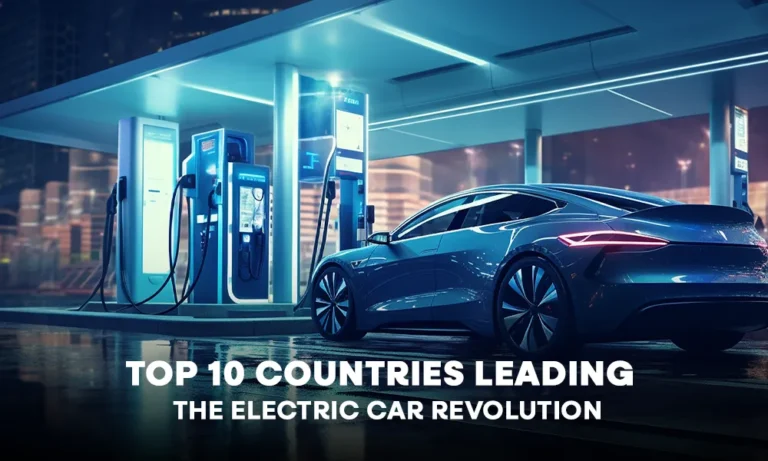I’ve always found it fascinating to witness the way innovation has reshaped the way we move, not just physically, but also culturally and environmentally. One such innovation has been electric vehicles, or EVs as they are commonly known.
In the past, these vehicles used to be novelties that we would point to and stare at when we saw one on the road. But that’s not the case any longer. Electric vehicles have now become a full-blown revolution, and some countries are moving ahead faster than others, whether it is in the adoption or manufacturing of these vehicles. From policy shifts to infrastructure leaps, governments globally seem to be in a race to prove who’s truly committed to a cleaner, smarter future.
So, I did some research to find out the top 10 countries that are leading the race in this electric transformation that we are witnessing.
1. China

China, leading the pack by far, is no surprise since it is home to the world’s largest EV market and manufacturing setup. It possesses clear dominance over all the other nations in battery technology, as well as the sheer number of electric models it manufactures and exports. For 2024, EVs formed half of the total car sales in China as per the IEA data. The reason the country is doing so well when it comes to EVs is its generous trade-in schemes and strong government support for domestic brands like BYD and SAIC. In fact, BYD, being more affordably priced, is now giving Tesla a run for its money in global markets.
2. Norway
I haven’t heard Norway being discussed as much when it comes to the EV revolution, but it seems to be doing phenomenally well when it comes to Battery EV (BEV) adoption. With 88.9% of all its new car sales for 2024 being BEVs, there’s hardly any doubt why it ranks second on this list. Although it’s a small country, and the actual number of EVs may be low, it has still performed commendably when it comes to EV adoption. What has led to the almost complete EV takeover of Norway roads is the mature government policy that provides a balanced mix of tax incentives and perks.
3. Netherlands
The Netherlands is another country that has a high BEV Adoption rate, boasting a 34.9% BEV share in 2024. The country has a dense charging network and offers company car incentives, which have helped encourage people to invest in BEVs.
4. Sweden

Sweden, too, has witnessed greater adoption of EVs, whether it is in the BEV category or the PHEV. For 2024, nearly 58% of all its new car sales were electric vehicles (BEVs and PHEVs), and the country is quickly becoming one of Europe’s fastest-growing markets for EVs. Sweden has also been able to successfully electrify its heavy vehicle fleet and has put in place the required charging infrastructure.
5. Denmark

Denmark has displayed the fastest BEV growth rate among the EU nations at the beginning of 2025. Numbers for as recently as January – May 2025 indicate that 66% of the new vehicles bought were EVs. Here, too, the main reasons for greater EV adoption were the rapid creation of public charging infrastructure and tax reforms that offered incentives for EV purchases.
6. Iceland
This tiny nation has had a massive impact when it comes to the EV Revolution globally. It has consistently posted one of the world’s highest EV adoption rates. Moreover, it boasts of a near-100% renewable energy grid and offers generous incentives for owners. This has meant that EVs dominate their new vehicle registrations.
7. United Kingdom

The UK is taking the sterner route when it comes to transitioning to EVs. It has brought in the legally binding Zero Emission Vehicle (ZEV) mandate. This requires that automakers ensure a growing share of their sales is electric, rising from 22% in 2024 to 28% in 2025 and going up to 80% by 2030. Despite the policy still being debated, the UK already has around one in four of its new cars being electric, putting it firmly on the global EV leadership map.
8. Germany
We have all come to regard Germany as Europe’s automotive powerhouse. Now Germany is also doing its bit to shape the EV market. Although the country has cut subsidies on EVs, which dented sales in 2024, Germany remains central to the EV revolution, thanks to its vast production base, innovation in EV models, and investments in domestic battery plants. The EV revolution, Germany is focusing more on industrial leadership than on EV penetration.
9. France
France is one of those countries that has been steadily climbing the EV adoption ladder, with around 16–18% of the new cars sold in 2025 being fully electric. The government is focusing on making EVs more affordable by supporting smaller, budget-friendly EVs alongside big French automakers. By balancing its green policy with consumer access, France is building momentum as a European EV leader.
10. United States
When it comes to absolute numbers, the U.S. ranks second in the EV market. It boasts of sales exceeding 1.5 million electric cars in 2024. However, its EV market share for BEVs and PHEVs sits at a meager 10%, which is why it ranks at number 10. But the US influence on the electric vehicle market cannot be denied and mainly comes from market scale, innovation, and a booming EV ecosystem led by Tesla and legacy automakers taking the electric route. Recent federal policy shifts could slow adoption even further. However, leadership by certain states like California and greater charging reliability will determine how the U.S. performs in this EV revolution.
In exploring these ten trailblazing countries, I’ve been reminded that the electric car movement isn’t just about tech. It also takes vision and commitment toward the kind of future we want to drive toward. Whether it’s China, Norway, the Netherlands, Sweden, Denmark, Iceland, the UK, Germany, France, or the US – each nation brings its own approach to the EV revolution. And while the road ahead is still evolving, one thing’s clear: the shift is happening, and it’s happening fast.
Explore Ask About Cars for the freshest stories shaping the future of mobility.







